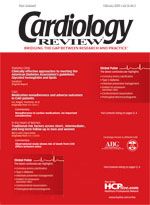Publication
Article
Cardiology Review® Online
BNP as a biomarker for heart failure
The diagnosis of heart failure rests on the clinical recognition of its typical symptoms, physical examination findings, and the laboratory evaluation. Other abnormalities, including pulmonary disease, obesity, and renal insufficiency, can mimic many of the clinical findings of heart failure. A reduced left ventricular ejection fraction on echocardiography in a patient with presumed heart failure confirms the presence of a cardiac abnormality and makes it likely that the patient’s signs and symptoms are indeed due to heart failure. Thus, a decreased left ventricular ejection fraction has been required for entry into most of the pivotal trials of therapy for heart failure. Many patients with heart failure, however, do not have a reduced left ventricular ejection fraction. Thus, there has been a search for an objective measure that will allow confirmation of the diagnosis of heart failure.
B-type natriuretic peptide (BNP) has received the most interest as a potential biomarker for the presence and severity of heart failure. BNP is one of a family of natriuretic peptides. It is predominantly synthesized and released from the ventricular myocardium in response to distention. BNP, and other natriuretic peptides, produce vasodilatation and natriuresis and counteract many of the detrimental effects of neurohormonal activation in heart failure. As such, increased BNP is a compensatory response to heart failure, and BNP is elevated in most patients with heart failure. The elevation of BNP is related to the severity of heart failure, and a marked elevation indicates a poor prognosis. BNP levels may decrease in response to treatment. Thus, BNP has been proposed as a useful measure for the recognition and management of patients with heart failure.
Not everyone, however, has endorsed the use of BNP in heart failure. Several concerns have been raised. First, heart failure is a clinical diagnosis, and BNP should not be used in isolation to diagnose or exclude its presence. Second, BNP is not completely sensitive or specific. For example, it is not elevated (> 100 pg/mL) in some patients with compensated chronic heart failure and in rare patients with severe, decompensated heart failure. It is possible that in these rare patients, the severe decompensation of heart failure is due to exhaustion of the ventricle’s ability to synthesize the compensatory BNP. Furthermore, BNP can be elevated in other conditions, such as myocardial infarction, pulmonary embolism, and renal impairment.
Another concern is that BNP levels rise with age in subjects without apparent cardiac disease, especially in women. For example, patients in their eighties who are in the upper quintile of “normal” have a mean BNP level greater than 100 pg/mL; however, these elderly subjects without apparent cardiac disease but with an elevated BNP have a poor prognosis. Thus, it is possible that although they are without apparent cardiac disease, the elevated BNP may indicate a compensatory response to subclinical heart failure.
The study by Mueller and colleagues (page 32) indicates that BNP measurement is not only useful in recognizing heart failure in patients with acute dyspnea, but it also improves their care by reducing length of hospital stay and associated costs. Thus, this study makes an important contribution to our understanding of the practical and economic advantages of measuring BNP in patients presenting with acute dyspnea.
Conclusion
This study adds to the growing data supporting the utility of measuring BNP levels for the recognition and management of patients with heart failure. Like any test, it is not perfect; it must be interpreted in light of the entire clinical situation. There is no real conflict between
the clinical assessment of heart failure and the measurement of BNP. Optimally, clinical judgment is based on an integrated assessment of all the important information about a patient. In the case of possible heart failure, especially when it presents as acute dyspnea, the important information now includes measurement of BNP. When used in this manner, BNP should improve the care of patients being evaluated and treated for heart failure. n





